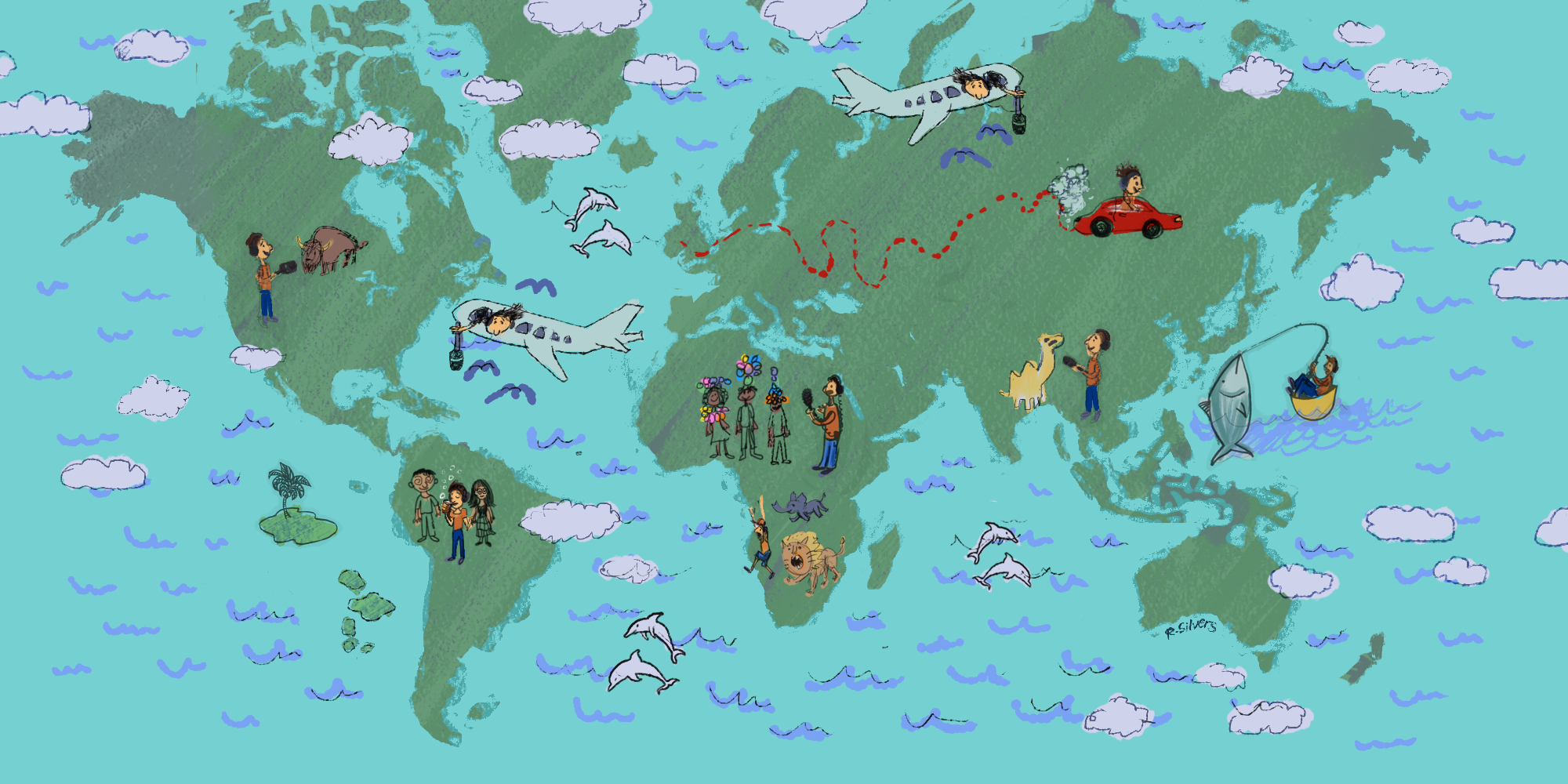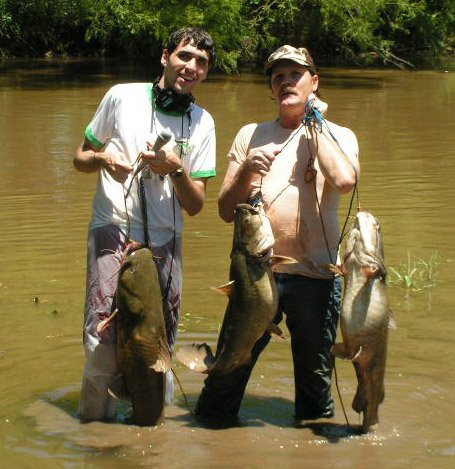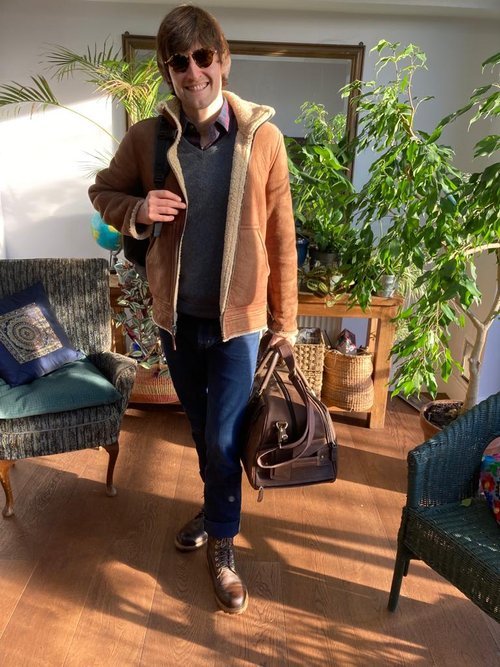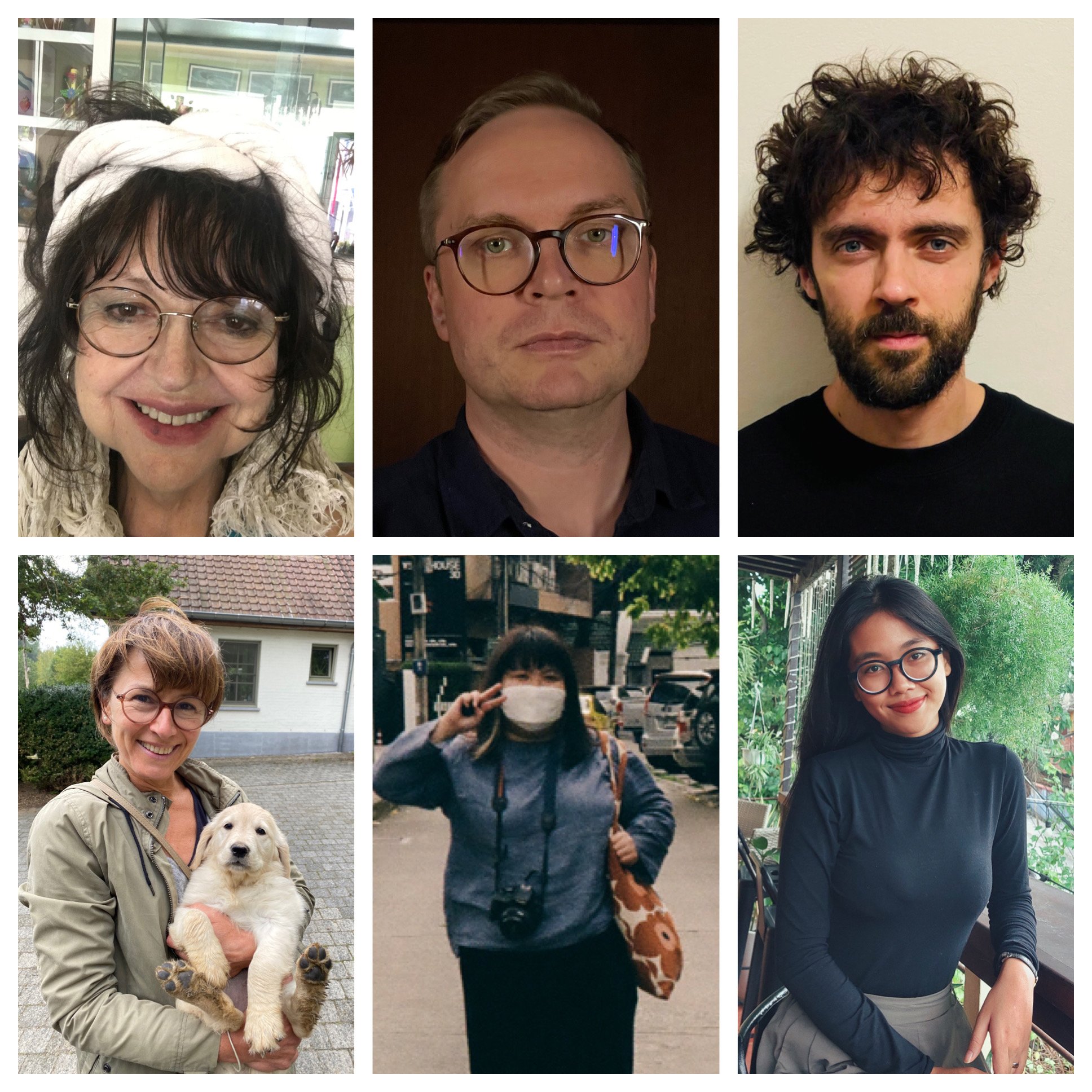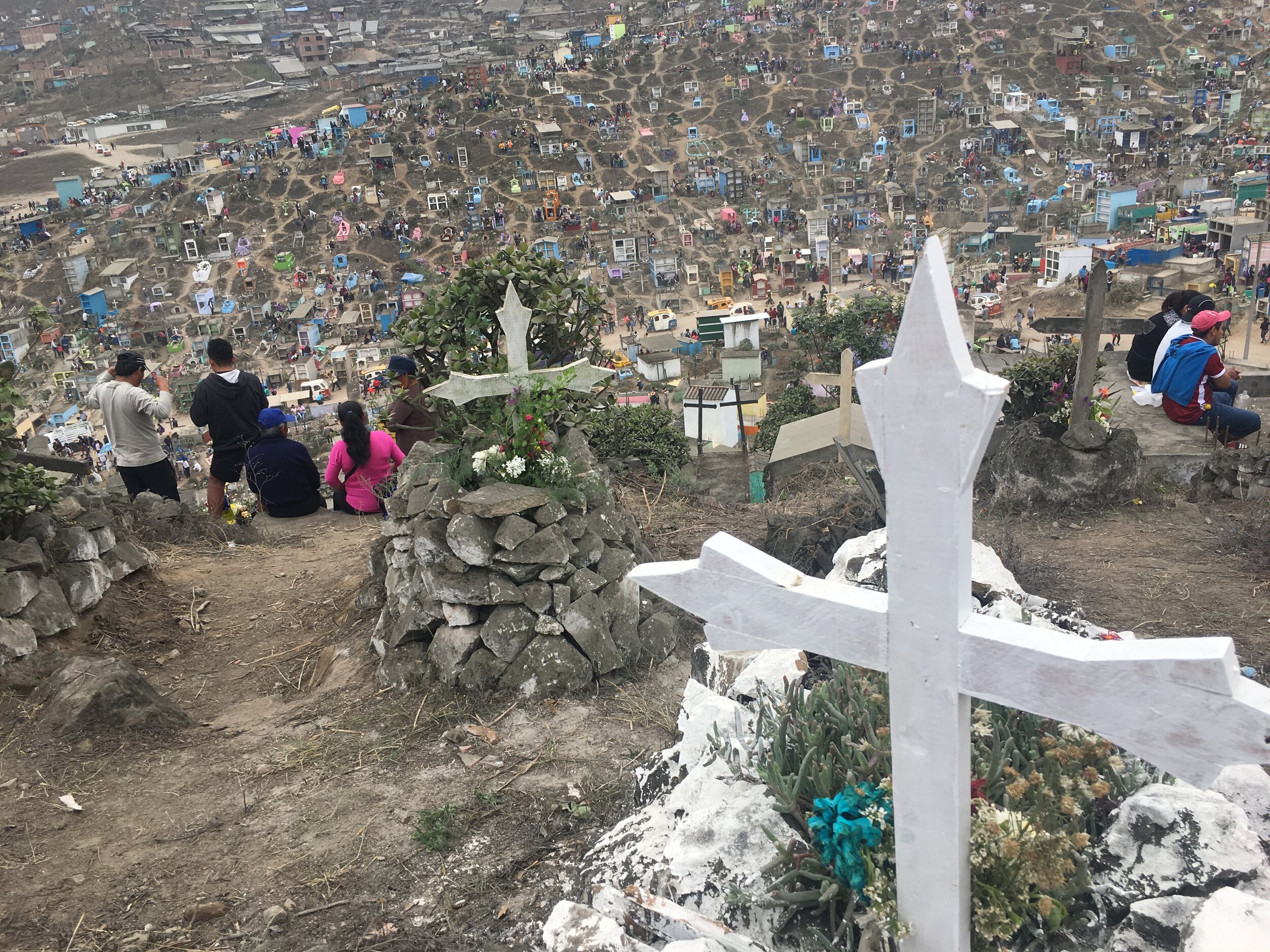On the third season of Far From Home, I continue sharing stories from around the world as well as closer to my own backyard. Amid a global pandemic, economic turmoil, and protests for racial justice, I check in to see how folks are doing, and I feature more reporting from faraway places from my pre-COVID travels.
banner artwork by Rebecca Silvers
EPISODES
If you appreciate this podcast, please consider leaving a review in Apple Podcasts.
If you're new to podcasting and want to learn how to listen to Far From Home on your phone or smart speaker or how to subscribe so you never miss a show, see my instructions here.
After missing the opportunity to see the last total solar eclipse in the United States back in 2017, I decided to add this experience to my bucket list and vowed I would do whatever it takes to see an eclipse in the future. A few weeks ago, I got my chance. Joined by my brother Drew and his friends Jeremy and Claire, I drove up to the woods of northern New Hampshire, and together, the four of us witnessed an event that far surpassed whatever expectations any of us had had. Here’s an audio postcard from our trip. Read More →
Thor Pedersen in Sri Lanka in 2023 (photo credit: Mike Douglas)
Thor Pedersen always felt like he was born too late. He grew up in a world where other people had already done most of the amazing things, like venturing to the North and South Poles, climbing the highest mountains, following the longest rivers, and exploring the depths of the deepest seas. But in 2013, at the age of 34, he discovered one record that no one had yet managed to achieve. So he went to the store, bought a map, and began marking it with a blue pen and a red pen. Before long, he hatched a plan to make history and get his name “on page 506 in some little book,” as he saw it: he would travel to every country in the world without flying, in a single, unbroken journey.
On this episode of Far From Home, he tells the story of that journey and how it turned out to be way longer and more difficult than he ever imagined it would be.
Check out Thor’s blog, where he documented his entire, decade-long trip. Read More →
After I released the last episode, I came across another short radio piece in my archives from my time as a reporter in Oklahoma many years ago. It’s about another unique cultural phenomenon I experienced, the world’s only behind-the-walls prison rodeo. Before a stadium of 9000 cheering fans, a hundred inmates from around the state competed in events like calf roping, steer wrestling, a wild horse race, and “Money the Hard Way,” a competition where people tried to grab a $100 bill that was tied between the horns of a charging bull.
Some of you might be entertained by this story, and some might be horrified. Or maybe you’ll fall somewhere in the middle. But for me, the craziest thing is that this event even happened at all.
Two decades ago, I was just starting out as a public radio reporter, applying for literally every radio job opening I saw, and somehow I ended up getting hired by a small station in Norman, Oklahoma. Given that the culture, politics, and geography were so incredibly different from anything I’d been exposed to up to that point. moving there from my home state of New Jersey almost felt like going to a foreign country. Yet despite any initial reservations I had, it turned out to be a really great experience, and the five years I spent there ended up making me a better journalist and a better person.
On this episode, I share a couple of my favorite radio stories I produced during my time in Oklahoma, to give you a small sense of the culture of this region that many Americans on the coasts simply regard as “flyover country.” First, I get to experience the traditional sport known as catfish noodling. Then I go on a rattlesnake hunt in southwestern Oklahoma. Read More →
If you listened to my last episode, you heard the story of my friend Jamie Yuenger, an American who moved from New York City to the Netherlands and was struggling to make the transition and figure out how to fit in. Following up on that theme, today I’m sharing a recent episode from my friends at The Bittersweet Life podcast, where co-host Tiffany Parks looks back at the past nearly two decades she’s spent in Italy and discusses the milestone she’s just reached of having now officially lived in Rome longer than she’s lived anywhere else.
If you enjoy this conversation, you can find The Bittersweet Life wherever you get your podcasts or delve into their archives of nearly 500 shows on their website, thebittersweetlife.net
Jamie Yuenger in New York City
From the age of 24 until she was 37, Jamie Yuenger lived in New York City. While she started out having a complicated relationship with the city, she grew over time to love her adopted hometown. Then a few years ago, she fell in love with a Dutch guy named Piet and decided to move to the Netherlands to be with him. That meant she’d be starting over in a new country where she didn’t understand the language or the culture. Jamie set about adapting to her new life, but it turned out to be way harder than she imagined.
Jamie has her own podcast called “If You Knew Me,” which features personal stories of the inner lives of women. You should also check out her other show, “Totem,” where she told the incredible story of how she met her husband Piet.
photo courtesy of Jack Boswell
Last winter during the pandemic, Jack Boswell started to reevaluate his place in life and realize that at the age of 31, he still hadn’t chased his real passion of being a Hollywood screenwriter. So he decided to quit his job and hop on a plane where he lived in London to head to Los Angeles and give it a go. But instead of flying directly there, he figured he’d instead land in Boston and make his way across the United States by train, documenting the places he visited and the people he met along the way.
Out of his experiences, he crafted the first season of his podcast “Off the Beaten Jack,” which ended up being nominated as best new podcast in the British Podcast Awards. On this episode of Far From Home, I chat with Jack Boswell and we listen to some excerpts from his show.
If you’re interested in learning more about Jack’s style of traveling, you can look into couchsurfing and Workaway volunteer opportunities (or Worldpackers, which is similar).
Recently, I teamed up with my colleagues at NPR’s Planet Money to report a story that prominently featured the Central Asian country of Turkmenistan — which is probably one of the most obscure countries in the world, and certainly not a place that most of us hear much about, much less visit. Only about 10,000 tourists a year cross its borders, but in the summer of 2016, my friends and I were some of the lucky few. We drove across Turkmenistan as part of an 11,000 mile road trip we were taking from London to Mongolia, raising money for charity. I documented that journey on the first season of this podcast, and today I’m re-releasing an excerpt of one of my favorite episodes called “Turkmenistan: Just Plain Weird.” If you enjoy this, I recommend going back to the very beginning of my feed and listening to my first season in its entirety!
A few months ago, a friend of mine named Oraz who runs an autobody repair shop in Turkmenistan came across a kind of puzzle. A new vehicle had just arrived on his lot. A white Lexus SUV. He could see by the registration sticker that it came from my home state of New Jersey, but the even stranger thing was the shape it was in. It was practically brand new, unlike like the dented and mangled cars that usually come to him for repairs. Oraz wondered: how did this car get here, to his shop? And what kind of place, what kind of person, casts off such a nice new car? Those questions led me on a journey through the international used car underground... all the way back to a pleasant, two-story home in suburban New Jersey. To find the answers, I team up with reporter Alexi Horowitz-Ghazi of NPR’s Planet Money podcast, which features fun and surprising stories about the global economy.
To hear the complete story of my road trip from the UK to Mongolia, when I broke down in the middle of the desert and first met Oraz, scroll back to the beginning of my feed and check out the first season of my podcast.
(Music used in this episode includes Filastine – Judas Goat feat. Hichman Enouiti which was licensed under a Creative Commons Attribution NonCommercial NoDerivs 3.0 license)
Several years ago, I featured a series of stories about Lucho, a traditional medicine man I met in Peru who uses medicinal herbs, archaeological relics, and plants to treat people with all sorts of ailments. In part one of my series, I joined him as he searched for a star-shaped stone with supposed magical powers that he saw in a vision. Then I accompanied him to a healing ceremony in a shantytown on the outskirts of Lima where he served participants a hallucinogenic brew called ayahuasca. I also consumed a small amount of the potion myself to understand what the experience was like for everyone else, but it didn’t seem to have much of an effect on me, and I wondered in the story whether I might be somehow immune.
Now it’s come to my attention that perhaps my takeaways from my experience might not have been entirely fair. On the latest episode, I chat with Nora Dunn aka The Professional Hobo, who’s been traveling the world as a digital nomad for the past 17 years, including a stint working with shamans in Ecuador and Peru. With her help, I revisit my previous reporting and get insights into what I might have gotten wrong.
While I’ve been hunkered down these past few years, avoiding traveling and staying home while I rode out the pandemic, I’ve been incredibly lucky that I’ve had a safe and comfortable place to live. But what has this experience been like for people in living situations that failed to provide basic levels of safety, privacy, and comfort?
On this episode of Far From Home, I play an episode from the Shelter podcast series that I co-produced with Rutgers University, coLAB Arts, and the New Brunswick Theological Seminary looking at the topic of housing insecurity in the era of Covid-19.
photo: Gerd Altmann / Pixabay
Over the past 2 months, more than 5 million people have left Ukraine, and another 6-and-a-half-million have fled their homes and are now displaced elsewhere within their own country, making this Europe’s largest humanitarian crisis since World War II. Neighboring countries are struggling to keep up with the exodus, but they’ve generally been fairly welcoming, which many critics have pointed out is a markedly different approach from how they’ve treated African and Middle Eastern refugees in the past. With so much of the world’s attention now focused on Ukraine, this episode featues the voices of refugees from other parts of the world, since their stories are of course equally important. The recordings come from the Sound Seekers Audio Festival and were produced by refugee, asylum, and migrant communities in partnership with community radio stations, the Irish Research Council, and the Broadcasting Authority of Ireland.
Olexander waiting out the war in Ternopil, Ukraine
On this episode of Far From Home, I speak to Savelli and Olexander, two Ukrainians who’ve suddenly had their lives upended after the Russian military invaded their country.
(Music used in this episode includes Impromptu in Blue by Kevin MacLeod, which is licensed under a Creative Commons Attribution 4.0 license.)
Central Asia is not a place that most Westerners know or think about very often. But now that I’ve been there, my ears perk up on the rare instances when it makes the news, as was the case on two separate occasions over the past few weeks. In light of recent developments in Kazakhstan and Turkmenistan, I re-play excerpts of some episodes I featured several years ago on the first season of Far From Home, where I documented an 11,000 mile road trip my friends and I took from the UK to Mongolia in a couple of really tiny cars.
Take Santa Claus. Then ditch the red suit and the flying reindeer, and you’ve got a guy who’s all about giving. On this last episode of my third season, I tell the story of the time my dad tried out the role and got more than he bargained for!
Nearly 2 years into the Covid-19 pandemic, new waves of infection continue to spread around the world, and the omicron variant is causing renewed fears in places that previously thought they had the virus under control. So I’m releasing another episode in my series where I check in with friends and colleagues around the world to get a sense of what things are like where they live. This time we hear voices from Guatemala, Finland, Ukraine, Belgium, Thailand, and Vietnam.
(Music used in this episode includes Impromptu in Blue by Kevin MacLeod, which is licensed under a Creative Commons Attribution 4.0 license.)
Recently, I played tour guide for my colleague Palle Bo, who’s the host of The Radio Vagabond podcast and has been to nearly 100 countries. Palle had been to my home city of New York several times before, so I figured I would get him out of Manhattan where most of the other tourists stay and bring him to see some interesting sites in the city’s outer boroughs. He ended up making a podcast episode about our experience that I really enjoyed, so I’m re-sharing it in my feed. You can read more and see some photos from some of the places Palle and I visited on his website.
When you travel, you’ll occasionally have weird or random experiences, where you might have certain expectations before you arrive at a place, but then you’re totally thrown for a loop. Sometimes it’s frustrating, and other times it ends up being a pleasant surprise, but either way, it’s unexpected, and there’s this moment where you can’t help but stop, take a breath, and think, “Wait. How did I end up here again?”
On today’s episode, I talk about how I found myself in a swarm of Justin Bieber fans in Bangkok, Thailand, and Nisreene Atassi — host of Expedia’s “Out Travel the System” podcast — shares the story of the time she and some co-workers went to a sushi dinner in Tokyo and ended up having a night they’d never forget.
In the days after 9/11, President Bush quickly vowed revenge against the perpetrators of the attack. But not everyone found his words comforting. A small but vocal group of family members of 9/11 victims got together to speak out for peace. Read More →
Knowing the rules and being able to navigate them can be a big part of feeling safe in any city. On this episode of Far From Home, I share an episode from another great podcast I recently discovered called “Here There Be Dragons,” where host Jess Myers speaks to residents of Stockholm, Sweden trying to figure out the norms, how to use them, and how to change them. Will they have to bend to Stockholm or will Stockholm bend to them?
If you enjoy this episode, I highly recommend subscribing to HTBD wherever you get your podcasts to hear more fascinating, behind-the-scenes stories from cities around the world!
To mark the fifth anniversary of the road trip I took to Mongolia that I documented on the first season of this show, I play a recent conversation my fellow travelers Drew and Rosi had with me and a small crowd of Far From Home fans and listeners. We look back at some highlights from our adventure, share behind-the-scenes stories, and take questions from the audience. If you want to read more about my journey, check out my Mongol Rally team website.
Graham and Sarah Marsden in Syria in 2010
Stories from travelers whose plans went horribly awry. First Graham and Sarah Marsden tell the story of their 2010 trip to Syria on the eve of the Arab Spring. Then Donna Salter shares how she ended up stranded on a tiny boat in the middle of very big ocean.
(Music used in this episode includes Desert City, Balzan Groove - Vadodara, and Darkening Developments by Kevin MacLeod, which are licensed under a Creative Commons Attribution 4.0 license. (source: http://incompetech.com/), as well as Filastine – Judas Goat (feat. Hichman Enouiti), which was licensed under a Creative Commons Attribution NonCommercial NoDerivs 3.0 license.)
Award-winning radio producer, audio archivist, and shortwave / pirate radio aficionado David Goren joins me to share fascinating recordings he’s made over his decades monitoring the airwaves. Read More →
On this episode of Far From Home, I continue my series checking in with friends and colleagues around the world to get a sense of the many ways COVID-19 is affecting people and how their governments are handling the pandemic. This time we hear from This in Switzerland, Emeline in Cameroon, Aldo in Mexico, Franz in Antigua, Sam in Tunisia, and Morgan in the Czech Republic.
A Geiger counter measuring radiation at the Chernobyl nuclear reactor
To mark the 35th anniversary of the disaster at the Chernobyl Nuclear Power Plant on April 26, 1986, I’m re-releasing an episode from my second season where my friend Donna and I visited the site of the explosion and toured abandoned buildings in nearby villages.
Read more about my visit and see additional photos here.
Each year on April 19th, residents of Oklahoma City commemorate the anniversary of the 1995 bombing in their city, which prior to 9/11 bore the distinction of being the deadliest terrorist attack on American soil. On this episode of Far From Home, I dig into my archives to share two stories I produced about the bombing from back when I was a reporter at a small public radio station in Oklahoma. Read More →
In light of the past week's riots in Northern Ireland, I speak to Irish journalist Don Duncan to get some context on what's going on. And I re-play a documentary I produced several years ago about the dozens of walls and fences that still separate many Catholic and Protestant neighbrohoods, even though it’s been more than two decades since a peace agreement was signed. Read more here.
Berlin-based science journalist Andreas von Bubnoff plays some recordings people around the world have submitted to the Pandemic Silence Project, documenting how COVID-19 has dramatically changed the way the world sounds.
When Justin and Patrice were planning a hiking trip across New Zealand and they asked friends for advice, they heard one thing over and over: “Wait ‘til you meet the people!” They didn’t think much of it at the time, but the kindness and incredible hospitality of the strangers they’d meet would end up blowing them away! Read More →
While I’m taking a break between seasons, I’m popping back into your feed with a special bonus episode from a really great podcast called Foreign Correspondence. It’s hosted by Jake Spring, who’s a journalist for Reuters based in Brazil. On his program, Jake does fascinating interviews with other journalists around the world, and on his latest episode, Jake interviewed me about how I got into journalism, my previous work in public radio, and some of the stories I’ve worked on for Far From Home.
On this final episode of Season 3, I return to where I began 2020 in Puerto Rico, on the last trip I took prior to the pandemic. I join my friend Rob at a parranda — the Puerto Rican version of Christmas caroling — except this parranda has a unique twist. Read More →
During this period when travel hasn’t really been possible, exploring places closer to home has given me a greater appreciation for all the fascinating and undiscovered adventures it’s possible to have right in my own backyard. Read More →
Cementerio Nueva Esperanza on the outskirts of Lima, Peru
While Americans were celebrating Halloween and heading to the polls, Peruvians were busy commemorating El Dia de los Defuntos, the day at the beginning of November each year when they remember their deceased relatives. On this episode of Far From Home, I visit one of the world’s largest cemeteries on the outskirts of Lima, Peru as thousands of people flock to their loved ones’ graves to eat, drink, and listen to music. Read more and see additional photos here →
Ryan in South Africa, Aditi in India, Ophelia in Ghana, Tony in Guam, and Vita in Lithuania
On this episode of Far From Home, I continue my series checking in with friends and colleagues around the world to get a sense of the many ways COVID-19 is affecting people and how their governments are handling the pandemic. This time we hear voices from Lithuania, South Africa, India, Ghana, and Guam.
If you have a unique perspective or experience on COVID-19 from your part of the world, I’d love to hear from you. Please drop me a line!
You probably missed it amid everything else going on in the world recently, but last week was the 15th anniversary of Hurricane Katrina, so on this episode, we’re staying within the U.S. for a change and going to New Orleans, revisiting what the storm was like for residents of the city and looking at parallels with the current situation with COVID-19.
I play some conversations I had in August of 2007 when I visited New Orleans and spoke with people who were struggling to rebuild their lives and reclaim this once great American city as their home.
Pablo in Peru, Alisson in Brazil, Oriana in the UK, Jo in Abu Dhabi (United Arab Emirates), Alex in Japan, and Daniel in Haiti
I’m beginning an occasional series where I’m checking in with friends and colleagues around the world to get a sense of the many ways COVID-19 is affecting people and how their governments are handling the pandemic. This time we hear voices from France, Haiti, Brazil, the UK, Peru, the United Arab Emirates, and Japan.
I’m hoping to do more shows like this, and I’d love to hear from listeners in far flung places! So if you’re living in a country we haven’t heard from yet and you have a unique perspective, story, or experience you want to share about what’s going on where you are or in your life, please drop me a line at info[at]farfromhomepodcast.org, and I’ll send you some instructions on what I’m looking for and how to send me a recording from your cell phone.
Thanks to radio producer Neil Sandell, who generously allowed me to share his confinement diary recordings with my listeners. Check out his Soundcloud page if you’d like to hear more of his work.
Natalia John at her home on the island of Barbuda
Barbuda is a 62-square-mile tropical island where no one has property titles. Since the 1800s, Barbudans have held the land in common. You put up a fence wherever you want to build, and it’s yours forever. Antiguans, represented under the same government, don’t have the same land rights. But on the heels of a major disaster, and after generations of living this way, the Prime Minister wants to change how things work. And a lot of Barbudans oppose his plan. I team up with NPR’s Planet Money to tell the story. Read more here.
This episode includes the song “B-Roll - Islandesque,” which was licensed from composer Kevin MacLeod under a Creative Commons Attribution license.
Crystal Egli and Parker McMullen Bushman
From the 1930s to the 1960s, Black motorists driving across the United States and Canada often brought along a copy of The Negro Travelers’ Green Book, which was a sort of AAA guide that told them which gas stations, hotels, restaurants, and other businesses were safe for them to stop at, and which areas they should avoid. Publication eventually ended after the passage of the Civil Rights Act, when things seemed to be improving. But now two Colorado women are trying to revive it in digital form. Parker McMullen Bushman and Crystal Egli join me to talk about their GoFundMe campaign and explain why they think we need a new Green Book. You can read more about their project at inclusivejourneys.com.
If you were forced to quarantine as a result of COVID-19 and could only hang out with members of one other household, who would you choose? Filmmaker Mike Hickey describes how a government experiment that limited the number of people he and his fellow residents of Newfoundland, Canada could interact with forced many people to make difficult and stressful choices. I also play some excerpts from Mike’s Double Your Bubble podcast, where he speaks to his friends about how they made their decisions.
Coy and his wife in Patagonia, Argentina
In light of the recent protests for racial justice across the United States and around the world, I chat with two African American friends about what it’s like to travel as a Black person, both in their own country and abroad. The stories they tell are sometimes funny and sometimes sad, but always eye-opening, and they shed light on what it’s like to constantly stick out from the crowd, even when you’re just trying your best to fit in. Read More →

